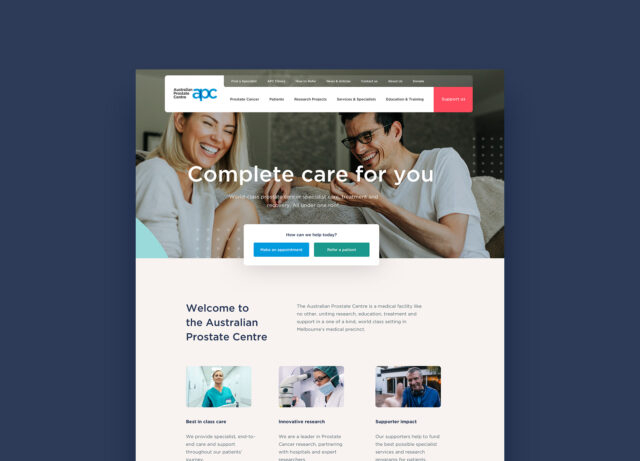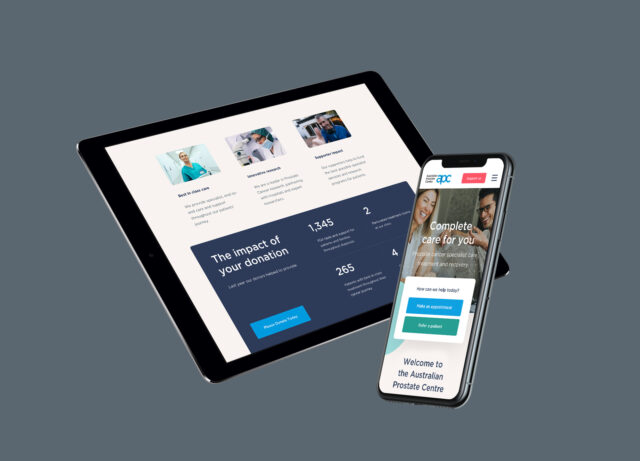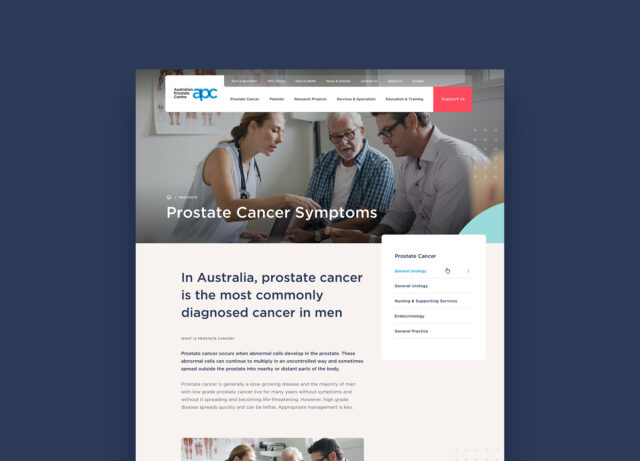
Australian Prostate Centre
Revitalised digital platform connecting to APC's key audiences
Just a decade ago, the Australian Prostate Centre (APC) took up its flagship mantle and entered the fight against prostate cancer. Today, it’s grown to become the nation’s leading organisation for research, education and clinical services.
Operating as a non-profit entity, without any government funding, the APC relies on a small number of dedicated philanthropic supporters and partners to continue the cause. From conducting mobile prostate cancer testing across Australia to hosting an international conference, it’s undeniable that the APC’s work is both significant and meaningful to public health and community.
That said, the APC’s growth and development was being held back by outdated digital platforms and assets. After a state review, it was found that the creation of multiple websites was diluting and confusing their key messaging, resulting in content gaps, poor online public user experience and an internal team lacking clarity.
We were asked to join them in reviewing the APC website structure and content, and to provide an updated digital platform that spoke easily to the APC audience. The key here was the user journey – we had to make certain that all content was clear and accessible; the look and feel was modern and uncomplicated; and that the APC team was provided with all the tools needed to regularly create, edit and publish content.

Optimised, easy-to-find content
The content created and shared by the APC is incredibly important. It often is, without hyperbole, a matter of life and death. But the information, education, stories and advice that they create is worth nothing if Australians can’t access it easily online.
Which brings us to the crux of our brief – provide an updated digital platform to support the APC in being the national resource leader for prostate cancer clinicians, patients and supporters.
First on the agenda was to re-architect the website to work for the APC’s key users and audiences, making all content optimised and easy to find. Speaking of content, we needed to facilitate the APC in delivering high-quality, industry-leading resources to both consumers and professionals within the industry.
This involved providing an ongoing support program for at-risk men and patients, inclusive of geographically diverse, marginalised and vulnerable communities, to better support men’s health and public health.

A simple user journey
We knew that finding a way to speak directly to the APC user was going to be integral to the success of this project. But to do this, we needed to have a thorough understanding of who that user was.
We found that APC patients are generally older, but because in-person visits had dropped due to the COVID-19 pandemic, they were struggling to find ways to connect with the organisation’s services. Many GP’s also expressed the desire for a resource that could summarise and guide their patients through specialist referral care.
It was determined that the primary need – that being an updated, modern and responsive APC website – had to speak to several different APC users, including: the general public looking to learn about prostate cancer; patients and potential patients; researchers looking to get involved with prostate cancer; donors and fundraisers who can raise money for research; and GP’s and other clinicians who use the APC has a patient resource.
We also needed to highlight the comprehensive range of clinical services being offered, the mental health and well-being support provided, the different programs for patient recovery available and the breadth of innovative and world-leading prostate cancer research being conducted by the APC.
In a nutshell, we needed to convey a lot to many people, most importantly in clear and concise language that made the intricacies of the prostate cancer journey easy to understand.

Strategy-led UX
After a thorough briefing on the APC’s needs, we implemented a strategy-led approach to improving the user experience. This involved ongoing consultation with key stakeholders, a comprehensive review of all available data relating to the existing website, and extensive user-experience research.
As part of this, we interviewed 40 APC individuals, ranging from patients to therapists, clinicians and stakeholders. This gave us incredible insight into user needs and behaviours.
Further workshops allowed us to deep dive and develop a range of user personas, which we used to map out customer journeys. This level of insight allowed us to develop a website experience that fulfills all users needs and, consequently, optimises site conversions on a macro and micro level.
When talking about information architecture, our main priority was to make the website content as accessible as possible. This was done by developing the core structure of the site with a strategic, user-centred approach, meaning the needs of different audiences could be fulfilled.
Given the ambitious goals and digital vision of the APC, not to mention the critical role the website will play in future growth and reach, our digital strategists worked closely with the design lead to ensure both an intuitive and easy-to-use experience for the user.
Evolution 7 provided an outstanding experience for the Australian Prostate Centre team in the journey to a new website and associated architecture.
With patients being overwhelmed with information around a cancer diagnosis providing simple, relevant navigation and content is critical. Evolution 7's expertise ensured we met this objective with our new website.
Mark Harrison, CEO, Australian Prostate Centre

The end result has delivered value to the user by providing a wealth of resources, easy-to-navigate information and content. The APC is unique in Australia and one of the few medical facilities in the world focused on the complete treatment and care of men with prostate cancer and urological conditions. We've loved being able to bring to life a website that all men around Australia can easily access and use a resource to help aid in the awareness and treatment of Prostate Cancer